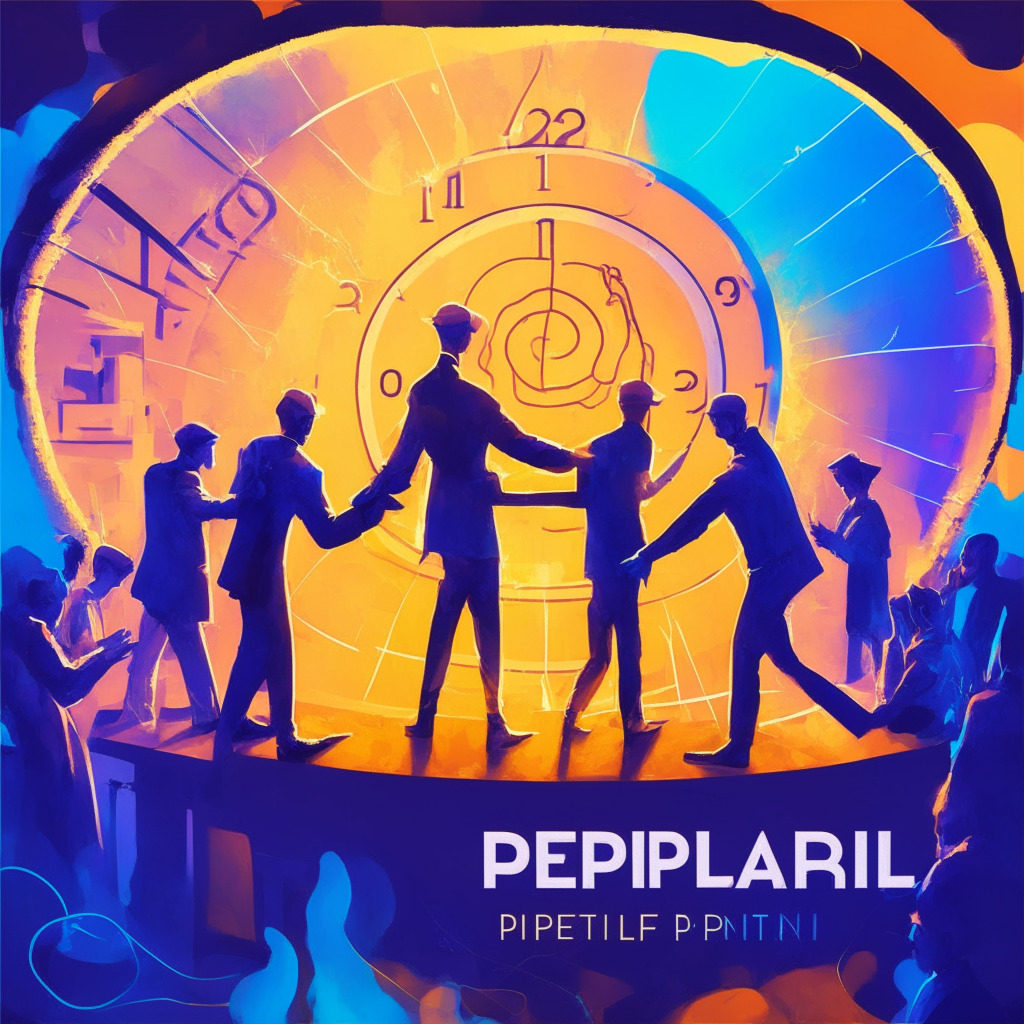The NoMeme ($NOMEME) token soared 700% within 90 minutes of its launch after Elon Musk’s tweet featuring a Milady NFT image. Now trading at $0.0003025 on Uniswap, $NOMEME has a liquidity of $1.7 million and a trading volume of $30 million, attracting crypto enthusiasts and sparking speculation on its potential for 100x returns.
Search Results for: opensea
Elon Musk’s Tweets: The Double-Edged Sword for Crypto Market Stability and Growth
Elon Musk’s tweet mentioning the NFT Milady from the Milady Maker collection led to a surge in its price, demonstrating his influential position in the crypto ecosystem. However, his actions raise questions about market stability, prudent investments, and potential market manipulation.
Meme Coin Mania: $NOMEME Surges 700% in an Hour after Elon Musk Tweet, Here’s Why
No Meme Token ($NOMEME) experienced a staggering 700% increase on Uniswap shortly after launch, largely due to a tweet from Elon Musk involving Milady Maker NFTs. Rapid market cap and trading volume growth set a solid foundation, but investors must remain cautious in a volatile market.
Elon Musk’s Tweet Boosts Milady NFTs: Resilience or Hype-Driven Market?
Elon Musk’s recent tweet featuring a Milady NFT caused the floor price to soar, showcasing the influence of prominent figures on the NFT market. Controversy surrounding the creator, Charlotte Fang, raises questions about the value of NFTs being driven by hype and celebrity endorsement rather than artistic or cultural merit.
Elon Musk’s NFT Endorsement: Boon for Blockchain or Hype-Driven Danger?
Twitter CEO Elon Musk’s endorsement of the controversial NFT collection Miladys sparked a 59% increase in floor price and raised questions about the impact of celebrity endorsements on the NFT market. With potential to fuel innovation, they may also perpetuate hype-driven fluctuations, affecting market stability and trust.
Transitioning from Web2 to Web3: Successes and Shortcomings in NFT Launches
Web2 companies entering the Web3 ecosystem face challenges, as success in traditional industries doesn’t guarantee smooth transition. Porsche’s NFT project struggled due to lack of transparency, confusing minting process, and poor marketing, while Reddit succeeded by integrating Web2 elements and providing accessible NFTs. Collaboration with Web3 native experts is key for successful ventures.
Navigating Market Downturns: AI’s Role in Simplifying Web3 Adoption and Security
AI and blockchain technology have the potential to join forces and revolutionize Web3, enhancing user engagement, personalizing onboarding processes, and strengthening security. By simplifying blockchain use cases, AI can help onboard 1 billion users and create a stronger future for Web3.
Former Coinbase Manager Sentenced: Insider Trading, Innovation, and Crypto Regulations
Former Coinbase product manager Ishan Wahi was sentenced to two years in prison for insider trading in crypto, reflecting increased scrutiny and enforcement efforts by authorities. Wahi exploited the “Coinbase effect,” making over $1.5 million by investing in new digital assets before they were listed on America’s largest crypto exchange.
Landmark Insider Trading Case: Crypto Regulation vs. Decentralization Debate
In a landmark case, former Coinbase employee Ishan Wahi has been sentenced to two years imprisonment for insider trading, setting a legal precedent for the SEC to crack down on similar offenses in the crypto industry. This case highlights the need for increased vigilance, regulatory transparency, and strict compliance measures to ensure a fair and reliable market for all players.
Insider Trading in Crypto: Balancing Decentralization and Ethical Standards
As the popularity of cryptocurrencies surges, insider trading scandals are emerging, highlighting concerns and challenges in ethics and transparency. Incidents like former Coinbase employee Ishan Wahi’s case and OpenSea’s Nate Chastain reveal the need for tighter regulations and ethical standards, ensuring crypto’s mainstream adoption is transparent and accountable.
Blend: Boon or Bane for NFT Lending? Exploring Opportunities and Risks in Crypto Lending
Blur’s launch of Blend, a peer-to-peer NFT lending platform, aims to introduce new buyers by lowering fiscal barriers for popular NFT collections. However, concerns arise over inexperienced collectors’ liquidity risks, potential market impact, and the platform’s ability to effectively protect lenders.
The Oracle’s Verse: Crypto Novel Revolution or Artistic Quality at Risk?
The Oracle’s Verse, a unique “crypto novel,” allows multiple writers to contribute to an ongoing story by selling their creations as evolving non-fungible tokens (NFTs). This innovative concept offers a decentralized alternative to traditional novel writing, providing passive income and instant publication on the blockchain, but raises questions about long-term narrative quality and consistency.
NFT Sneakers: Innovation or Barrier for Average Consumers? Pros & Cons Explored
Basketball star LeBron James sported limited-edition RTFKT x Nike Air Force 1 Genesis sneakers before a game, which are obtained through Ethereum NFTs. With opportunities for brands and fans, questions on exclusivity, practicality, and inflated valuations in secondary markets arise. Balancing innovation and accessibility is crucial for blockchain and NFTs in fashion and consumer goods.
Sotheby’s NFT Marketplace: A Boost for Digital Art or a Step Away from Inclusivity?
Sotheby’s expands its Metaverse platform by launching a blockchain-based NFT marketplace focused on secondary sales and curated digital art. This move, met with excitement and uncertainty, may bring added value to the NFT market or face challenges attracting sustained buyer interest amid a struggling NFT market.
Goblintown S2 Targets Worst NFT Traders: Innovative Move or Ethical Dilemma?
Truth Labs targets the worst NFT traders with its upcoming Big Inc collection, offering free NFTs to top 1,000 unsuccessful traders or holders of its other collections. Despite concerns on exploiting failures and privacy issues, this innovative approach has captured audience attention and contributes to debates on ethical practices and the future of Web3 technology.
Blend’s NFT Collateralized Lending Protocol: Boon or Bane for Crypto Enthusiasts?
NFT marketplace Blur introduced its collateralized lending protocol, Blend, enabling a buy-now-pay-later approach for NFTs, using NFT collateral for fee-free lending. The move garnered mixed reactions, with proponents highlighting its potential to enhance efficiency, while critics voiced concerns over the risks associated with NFT lending and its impact on the volatile NFT market.
Perpetual Lending Protocols & NFTs: Revolutionizing Finance or Risky Business?
Perpetual lending protocols and non-fungible tokens (NFTs) have recently gained significant attention in the world […]
Ethereum Network Fees Skyrocket Post-Shapella Upgrade: L2 Solutions Rising
Ethereum network fees have experienced a significant upswing following the implementation of the Shapella upgrade […]

















